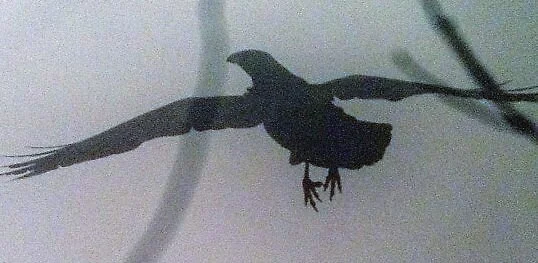A Poem by J. Drew Lanham
Listen

The cold comes hard here,
drops sudden,
falls heavy.
Borne far above the lake locked land
it descends to
render the rivers
still as though they never ran.
Clouds the mirrored waters
beneath
slick glazed shield that sends the loons crying
south—
later now than in the old days, when
Gichi-gami went thick,
When Baashkaakodin Giizis
wished it so.
Yet —it comes.
The cold comes to make soft ground solid
shrinks autumn waning light
to dim
then draws the doors shut on days
so that only the dull slivers shine through.
The cold sends the sun to wait on solstice.
The cold comes to make living hard.
The cold is not quaint or subtle.
It gives no quarter. There is no comfort
in the cold, save deep slumber
or dying.
Winter cold is a lynx that chases warm fleeing
to other seasons —
or else to flounder as hapless prey in chilled jaws.
But, I cannot speak of your cold
beyond dreaming.
I only know of it when ravens let rumors
fly loose
on somnambulant winds blown on dreams.
Awk! Awk! Awk!
They circle and soar to tell me of winter,
where snow is stubborn. Where ice hides time.
Where cold is master of every being.
The raven calls me between rapid eye blinks to see the
wild things huddled against the cold,
or secreted away in dank burrow or worm worn hole.
Oook oook oook oook ooook!
The raven insists I dream, see one wild thing set upon the other wild thing
to sate hunger
or starve.
Wild things know the cold. Live in it.
Die by it.
Gaagaakshiinh, the raven who remains in my dreams
past the others flown into nothing
— tells me
that the cold is not cruel to his band of black kindred,
but kind because the hooved ones
will provide.
That there is no planning
the two-toed kind make,
(she claims) when the hunger calls.
When the river pack howls
darkness
down
to drape the great woods
in moonlit shrouds.
and in fear,
says Gaagaakshiinh.
The moose’s withers tremble like slender twigs,
as he rises long-legged from piss warm bed.
Long ears swivel to catch the dog’s chorus,
The deer stir in their yards,
stare doe-eyed into gray shadows thrown
on lunar lit drifts to catch glimpses of the end.
By sun’s next rising white lain down before dawn,
will lie stained red,
the black ones count;
ook ook
Oook oook oook
Raven math divines one less to browse spring tender shoots
one less to secret fawns in fern soft woods
for the black bears
to reclaim half.
One less to suckle life by summer’s long mosquito thick days.
One sacrifice to feed all who will come after the pack fills bellies
to swollen.
It is the way of things
when winter comes.
The cold is a blade
The wolves are blades made
to thin the herd.
The raven tells me of it in these dreams,
and I listen because she is wise in ways that I am not.
For I do not know of your cold, or wolves or moose.
I do not know of terror to the bare bone
the deer know when death is sure.
Gaagaakshiinh claims (with great-beaked authority)
that the cold will take
what the wolves cannot catch
That those left standing will cleave stronger
to the land come warmth of warm moons.
A time coming absent the slow, absent the careless.
In my raven fed winter dreams, I am told
that the great gray owl witnessed this necessary thinning.
The cold blade honing the packs cunning.
Taking by tooth and claw life once burning hot
now cooling
spilled out .
The owl (says Gaagaakshiinh)
sat on the edge of it .
Sat still on a tamarack’s bent bough.
Slow blinking in the flakes head turning from one day to the next,
It sat as the snow fell ,
each flake
falling as if each would become mouse.
The owl watched the waifs slip through spruce —
at first, the crackling
of icy crust giving
beneath each step,
Raven counts a pair, then another
and another. There, one more.
I saw in my dreams through the owl’s eyes
by way of the raven’s mouth
the pack circling the meadow clearing,
each wild dog’s breathing fog
exerted to same strategy.
Chase. Kill. Eat.
hot canid breath rose to clouds of death to come.
One by
one,
single-filed plans made,
chase designed
each threads silent
as snarling pike under still lake glides.
A shoulder
then ribs
urgent haunches tensed.
Never all at once, only bits of the whole.
A glimpse of hide —
yellow eyes glow.
Knowing that it is better to be seen afar
than be smelled close in fear.
They enter mortal stage downwind. Final act begins.
The woods, darker than black
fills with deer bolting riot.
The herd slogs in nightmare
wrapped in black raven seeing. Black man dreaming.
And the great gray owl saw firsthand,
as told by the raven
(who know everything of cold but sat huddled warm together in the darkness)
Heard every lung labored gasp,
brown shadows scattered.
Saw when the beasts of the long night made short another hooved life
The muffled snarls. Flesh tearing. Eyes walling
Last gasps of ruminant memory drained
Whitetail becomes wolf in gulps
The snow fell. The cold gnawed at the fat marrow.
All slid into silence.
Dead Quiet.
Whiskey jacks came noisy at first light.
The raven floated in at dawn .
She called black band in to glean,
krook!krooc!krooc!
chickadees chatter to draw lots for shreds
left between bones.
An eyeball left staring glazed into blue sky is Gaagaakshiinh prize.
Ermine hid where it stood, waiting a turn.
The drifts grew deep as snow falls once more
The owl saw, told raven,
who told me.
I woke into a void full of sharpness, silence, fear death,
But empty of all that had been. All that was.
and then —
I shivered. Knew your cold.
As Raven told it to me.
Listen to a reading of the poem by J. Drew Lanham.
Cultural Acknowledgment:
I have written and attempted to speak with veracity and reverence, the words and language of First Nations and Indigenous Peoples. I am not indigenous nor First Nations, but am deeply grateful to the Anishinaabeg and Ojibwe People, and all First Nations and Indigenous Peoples, acknowledging their presence in lands that I have known, and hope one day to know.—J. Drew Lanham

J. Drew Lanham, PhD, is an Alumni Distinguished Professor and Master Teacher of Wildlife Ecology at Clemson University A contributing editor for Orion Magazine, he is a cultural and conservation ornithologist whose work addresses the confluence of race, place and nature. Drew is the Poet Laureate of Edgefield County, SC and the author of Sparrow Envy – Poems (Holocene 2016, Hub City 2018), Sparrow Envy – A Field Guide to Birds and Lesser Beasts (Hub City 2021) and The Home Place -Memoirs of a Colored Man’s Love Affair with Nature (Milkweed 2016/Tantor Audio 2018), winner of the Reed Environmental Writing Award (Southern Environmental Law Center), the Southern Book Prize and a 2017 finalist for the Burroughs Medal. The Home Place was named memoir and scholary book of the decade (Lithub and Chronicle of Higher Education, respectively). Drew’s creative work and opinion appears in Orion, Vanity Fair, Oxford American, High Country News, Bitter Southerner, Terrain, Places Journal, Literary Hub, Newsweek, Slate, NPR, Story Corps, Threshold Podcast, Audubon, Sierra Magazine, This is Love Podcast and The New York Times, among others. He is ever-present on YouTube with his “Nine Rules for the Black Birdwatcher ” and other videos serving as impetus for much of his work on convergent social and nature-bases issues. You can find him on several social media platforms where his being as a “man in love with nature” becomes obvious. Drew is a lifelong bird watcher and hunter-conservationist living in Seneca, SC.

